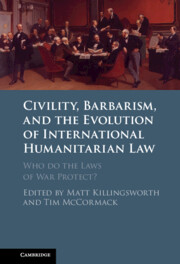 Civility, Barbarism and the Evolution of International Humanitarian Law
Civility, Barbarism and the Evolution of International Humanitarian Law Book contents
- Civility, Barbarism, and the Evolution of International Humanitarian Law
- Civility, Barbarism, and the Evolution of International Humanitarian Law
- Copyright page
- Contents
- Contributors
- Preface and Acknowledgements
- Abbreviations
- 1 Introduction
- 2 Sieges and the Laws of War in Europe’s Long Eighteenth Century
- 3 All’s Fair in Love and War or the Limits of the Limitations
- 4 Cultivating Humanitarianism
- 5 Limits to the Scope of Humanity as a Constraint on the Conduct of War
- 6 The State, Civility, and International Humanitarian Law
- 7 Operationalising Distinction in South Sudan
- 8 Private Military and Security Companies and International Humanitarian Law
- 9 Protecting Warfighters from Superfluous Injury and Unnecessary Suffering
- 10 Blurring the Lines
- 11 A Step Back to Take a Step Forward
- Index
- References
3 - All’s Fair in Love and War or the Limits of the Limitations
Juridification of Warfare and Its Revocation by Military Necessity
Published online by Cambridge University Press: 11 January 2024
- Civility, Barbarism, and the Evolution of International Humanitarian Law
- Civility, Barbarism, and the Evolution of International Humanitarian Law
- Copyright page
- Contents
- Contributors
- Preface and Acknowledgements
- Abbreviations
- 1 Introduction
- 2 Sieges and the Laws of War in Europe’s Long Eighteenth Century
- 3 All’s Fair in Love and War or the Limits of the Limitations
- 4 Cultivating Humanitarianism
- 5 Limits to the Scope of Humanity as a Constraint on the Conduct of War
- 6 The State, Civility, and International Humanitarian Law
- 7 Operationalising Distinction in South Sudan
- 8 Private Military and Security Companies and International Humanitarian Law
- 9 Protecting Warfighters from Superfluous Injury and Unnecessary Suffering
- 10 Blurring the Lines
- 11 A Step Back to Take a Step Forward
- Index
- References
Summary
Humanity and civility were established as new leading principles of international law during the last decades of the nineteenth century. But the restriction of war itself was a battlefield. Some authors conceptualised the restrictions on warfare explicitly as of a social custom quality or as ‘chivalric practices’ of ‘moral value only’. Probably the most fundamental attack on international law’s limits came from the idea of ‘military necessity’. It was limiting law’s limitations. And in its most radical variant, it was evoked not only in those cases which explicitly referred to it but in any regulation of warfare. This was a specific, particularly militaristic understanding of ‘necessity’, and its effect was unleashing: the laws of war would lose their binding force. Necessity could revocate any ties, be they moral or legal. Pre-1914 international law was in some areas pretty far away from humanisation, universalism, and also from positivism. It was relativising and legitimating excessive violence.
Keywords
- Type
- Chapter
- Information
- Civility, Barbarism and the Evolution of International Humanitarian LawWho do the Laws of War Protect?, pp. 34 - 60Publisher: Cambridge University PressPrint publication year: 2024


